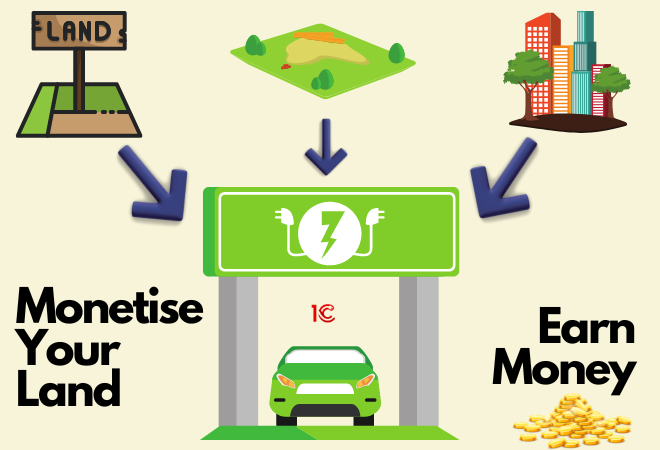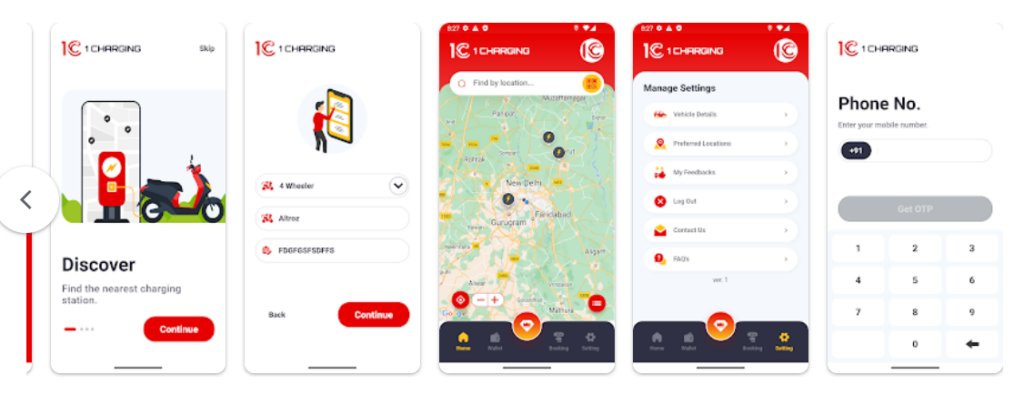Menu
Menu


Updated on Mar 8, 2024 | 6 min read
Key Insights:
EV sector is growing day-by-day and the charging stations and charging points has become hot area to tap for the business people. If you are looking for a business idea and you have a spare land, a building or a plot, then transform it into a profitable EV charging station today. This blog will help you provide the information regrading the requirements for getting a charging station for EV and how to setup details, Revenue model and ROI period, and cost and investment requirement. So, lets move further and understand what is the profitability and how can you setup your own charging station.
Electric vehicle charging stations play a vital role in the transition to electric vehicles, with revenue being a key aspect of their sustainability. Here, we delve into the various revenue sources that EV charging stations can leverage to ensure profitability and long-term viability.


One Stop Solution to find a verified charging station near by.

5. Value-Added Services: Offering value-added services such as Wi-Fi, food and beverage options, vehicle washes, and grocery shops enhances the customer experience and increases revenue opportunities for EV charging stations.
The profitability of an EV charging station hinges on various factors, including location and market demand. However, given the escalating popularity of electric vehicles, charging stations are expected to remain important to the EV market, offering promising prospects for success.
In our comprehensive guide EV Charging Station cost in India in 2024, we delve into all the details concerning the costs and investments associated with setting up an EV charging station. Here’s a snapshot of what you’ll need to consider:

Here’s an approximate estimation provided by Cars24, based on a general scenario and a supply of 250 KVA EV stations, to give you an idea of the costs involved in setting up an EV charging station:
Based on these estimates, setting up an EV charging station with one charger of each type, on leased land, could cost approximately Rs. 40,00,000 in the first year, including setup. The annual maintenance cost from the second year could be around Rs. 10,00,000 (including land lease), and operational costs would include software maintenance, technical maintenance, and manpower.
When considering investing in an EV charging station in India, it’s crucial to grasp the revenue model to assess potential returns. Let’s illustrate this with a different example:
Assuming an initial investment of Rs. 50 lakhs and a daily usage of 800 kWh units of power, let’s explore the projected income over five years. We’ll use a tiered pricing model, with rates ranging from Rs. 12 per unit for standard charging to Rs. 20 per unit for fast charging.
Year 1: 800 kWh per day
Fast Charging (Rs. 20 per unit): Rs. 16,00,000/-
Years 2-5: Assuming a 10% annual increase in usage and constant pricing.
Total Revenue over 5 years:
Combining both charging types, the total revenue for five years would be Rs. 1,44,29,760/-

Establishing an EV charging station requires essential infrastructure to support the charging process. Firstly, the station needs various chargers such as CCS-60kW, CHAdeMO-60kW, Type 2 AC-7/22kW, Bharat DC-001-GB/T Charger, and Bharat AC-001 Charger. A new electricity connection with a capacity of 250 KVA is necessary to power the charging units. Civil works, including site preparation and construction, are vital for creating a suitable environment for the station. The implementation of EVSE (Electric Vehicle Supply Equipment) management software and integration ensures efficient operation.
Moreover, having technicians, manpower, and a maintenance plan is crucial for ongoing service and upkeep. Advertising and promotion play a role in attracting users, while land lease costs may apply if the station is situated on leased land. These basic infrastructure requirements collectively contribute to the successful establishment and operation of an EV charging station.
When establishing an EV charging station in India, it is essential to evaluate factors such as Return on Investment (ROI) and payback period. While the considerable initial investment might pose risks, it is crucial to weigh the long-term benefits and potential earnings. The ROI and payback period can vary based on factors like the charging station type, location, and utilization rate. A comprehensive analysis of these elements assists in calculating the payback period, representing the time required for generated income to recover the initial expenditure. A shorter payback period and higher ROI can signify a more favorable investment opportunity.
In the fast-changing world of EV charging businesses, 1C is your go-to partner for boosting efficiency and making more money. Our Charging Management System (CMS) helps new EV charging businesses set up easily, manage energy wisely, and provide a smooth experience for users. By teaming up with 1C, charging station owners can follow rules, use top-notch tech, and see profits faster. Ready for success in the growing EV market? Partner with 1C today!
© 2024 Massive Mobility Private Limited. All rights Reserved